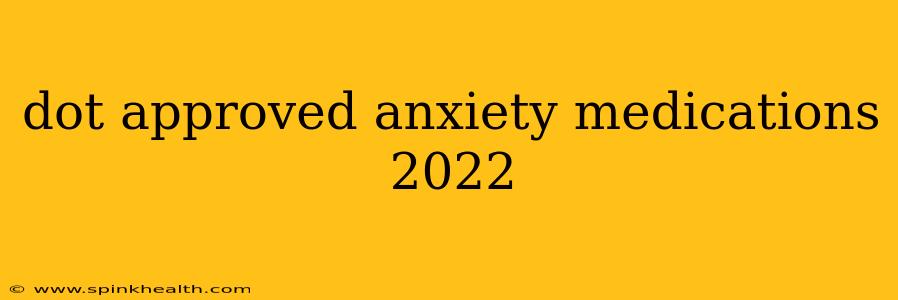The open road. The freedom. For many, driving a commercial vehicle is a dream job. But for some, the pressures of the job—long hours, demanding schedules, safety responsibilities—can trigger or exacerbate anxiety. This is where the question of DOT-approved anxiety medication becomes crucial. Finding the right balance between managing anxiety and maintaining your commercial driver's license (CDL) can feel like navigating a winding, unfamiliar highway. This guide aims to shed light on this complex issue, offering clarity and information for drivers facing this challenge.
It's important to preface this by stating that I am not a medical professional. This information is for educational purposes only and should not be considered medical advice. Always consult with your doctor and a DOT-qualified medical examiner (DME) before starting, stopping, or changing any medication.
What Medications are DOT-Approved for Anxiety?
The Department of Transportation (DOT) doesn't have a specific list of "approved" medications for anxiety. Instead, they focus on whether a medication affects your ability to safely operate a commercial motor vehicle. The key is whether the medication impairs your judgment, reaction time, alertness, or other essential driving skills. Each case is evaluated individually by a DME, considering factors like:
- The specific medication: Different medications have different potential side effects.
- The dosage: A low dose might be acceptable, while a higher dose could be disqualifying.
- The individual's response to the medication: How the medication affects you specifically is paramount.
- The driver's overall health: Pre-existing conditions can influence the DME's assessment.
Can I Drive a Truck with Anxiety?
Absolutely. Many commercial drivers successfully manage anxiety while maintaining their CDLs. The key is proactive management and open communication with your healthcare providers and the DME. Never attempt to self-medicate or hide your condition. Honesty and transparency are essential.
What are the common side effects of anxiety medications that might affect driving?
Many anxiety medications can cause side effects that could impair driving ability. These can include:
- Drowsiness: This is perhaps the most common concern. Even mild drowsiness can significantly impact reaction time.
- Dizziness: Dizziness can lead to loss of control and accidents.
- Blurred vision: Reduced visual acuity is a serious safety hazard.
- Impaired coordination: Difficulty with fine motor skills can affect driving performance.
What if my anxiety medication is affecting my ability to drive safely?
If you experience any side effects that could impair your driving, you must inform your doctor and your DME immediately. They can help adjust your medication, dosage, or explore alternative treatment options. Driving while impaired is not only dangerous but also illegal. Your safety and the safety of others are paramount.
Are there non-medication options for managing anxiety?
Yes! Several non-medication approaches can effectively manage anxiety:
- Therapy: Cognitive Behavioral Therapy (CBT) and other therapeutic approaches can help you develop coping mechanisms for anxiety.
- Lifestyle changes: Regular exercise, a healthy diet, sufficient sleep, and stress-reduction techniques (like mindfulness or meditation) can significantly impact anxiety levels.
What should I discuss with my doctor and DME about anxiety and driving?
Open and honest communication is key. Discuss:
- Your anxiety symptoms: Provide a detailed description of your experience.
- Your current medication (if any): Be completely transparent about all medications you're taking.
- Your concerns about driving safely: Express your worries and seek guidance.
- Alternative treatment options: Explore non-medication options alongside medication.
Driving a commercial vehicle requires significant responsibility and alertness. Managing anxiety while maintaining your CDL requires a collaborative effort with your healthcare providers and a commitment to prioritizing safety. Remember, seeking help is a sign of strength, not weakness. Your well-being and the safety of others depend on it.

